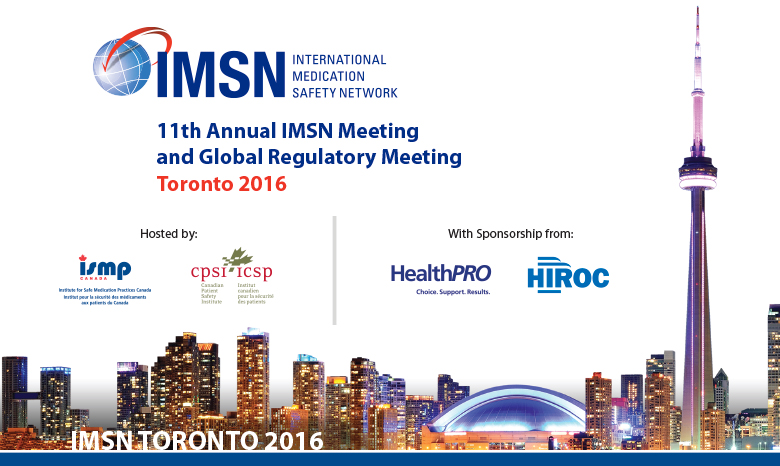 The Institute for Safe Medication Practices Canada (ISMP Canada) and the Canadian Patient Safety Institute (CPSI) co-hosted the 11th Annual IMSN Meeting and Global Regulatory Meeting held on October 24, 2016 in Toronto, ON, Canada.
The Institute for Safe Medication Practices Canada (ISMP Canada) and the Canadian Patient Safety Institute (CPSI) co-hosted the 11th Annual IMSN Meeting and Global Regulatory Meeting held on October 24, 2016 in Toronto, ON, Canada.
At the IMSN Global Regulatory Meeting: Designing Medication Safety at the Global Level held in Toronto, Canada on October 24, 2016, delegates from 17 member countries shared their views and concerns with invited regulators on factors that contribute to medication errors at a global level. The main regulators involved in this field, such as the US Food and Drug Administration (FDA), Health Canada, the European Medicine Agency (EMA), and the Medicines & Healthcare Products Regulatory Agency (MHRA), were joined by the World Health Organization (WHO) Patient Safety program. A separate session was held with major IV solution and technology companies on October 25, 2016, including Aguettant, Baxter Healthcare, B. Braun, BD/Carefusion, Hospira/Pfizer, Grifols, and Fresenius Kabi.
Participants agreed on the following actions to be addressed immediately to protect patients from medication errors at a global level:
- Safer packaging of medicines in ready-to-use forms, such as premixed intravenous infusions, prefilled syringes for high-alert injectable medications (including vaccines), and oral cytotoxics packaged in patient packs to support their specific posology;
- Safer labeling of medicines, including the presence of a bar code or other machine readable identification on each unit-of-use dosage form to facilitate use of available technologies now and in the future;
- Safer medication labelling with unequivocal expression of doses;
- Metric graduations on all dosing devices for oral liquids;
- Safer nomenclature by banishing dangerous abbreviations and umbrella brands;
- Safer practices in using medicines that easily expose patients to serious risks of error, such as opioids and acetaminophen/paracetamol;
- Recognition of the expertise needed for analysis (including an assessment for contributing factors in preventable adverse drug reactions) and prevention of medication errors, whether by promoting the role of medication safety officers or by encouraging premarket assessment of medicines and associated devices by manufacturers.
Participants agreed that effective bidirectional cooperation between safe practice centers, patient safety organizations and the pharmacovigilance community is needed.
In order to achieve a reduction of harm related to medication errors, harmonization at the global level also is necessary. The IMSN is committed to this harmonization of safe medication practices as they impact packaging and package labeling. Therefore, the IMSN is calling for a follow-up summit with regulatory authorities in order to establish minimum requirements and an action plan for medication safety worldwide.
Beyond product improvement, the IMSN supports the World Health Organization’s Global Patient Safety Challenge on Medication Safety, through the participation of several IMSN members. IMSN members are contributing to the WHO initiative to tackle obstacles and propose solutions to improve the safety of medication practices.
